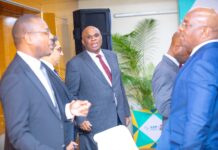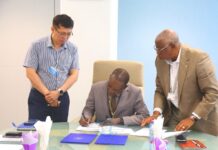By Adjei Dickens OFORI ASARE
Ghana’s democracy faces critical challenges, including declining trust in institutions, widespread perceptions of corruption, and a growing “democracy deficit.” That was the sobering assessment shared by Dr. Osae-Kwapong, Project Director of the Democracy Project, during his presentation at the University of Media Arts and Communication (UniMAC) forum on November 22, 2024 via zoom.
Speaking at the event titled “The Election Dividend: Threats to Democracy, the Role of Communication, and Reinventing Civic Responsibility”, Dr. Osae-Kwapong laid out the urgent need for robust civic engagement and independent institutions to address these threats.
A Democracy Under Strain
Dr. Osae-Kwapong began by highlighting findings from various governance surveys, including Afrobarometer and the Ibrahim Index of African Governance, which point to a troubling erosion of public trust in Ghana’s key democratic institutions. “The executive, parliament, and judiciary are all experiencing a crisis of confidence,” he noted.
Perceptions of corruption further compound this trust deficit. “When citizens see institutions as corrupt, it undermines their legitimacy and makes it harder to build a strong democracy,” he explained.
Adding to these concerns is Ghana’s “democracy deficit”—the gap between citizens’ support for democracy and their satisfaction with how it functions. “We support democracy, but dissatisfaction with its performance has grown, particularly in recent years,” he said, citing Afrobarometer data.
The Role of Elections and Institutions
Dr. Osae-Kwapong pointed out that while Ghana excels in organizing elections, other aspects of governance remain weak. “We’ve figured out the electoral part of democracy,” he observed. “But deepening democratic practices, ensuring judicial independence, and strengthening institutional checks on executive power are areas where we are falling short.”
He also flagged the role of the media as a potential solution but warned of its own challenges. “The media should be an independent and fair arbiter in mediating partisan debates. However, trust in media is low, and there are widespread perceptions that journalists often spread misinformation,” he said.
A Path Forward
For Dr. Osae-Kwapong, addressing these threats requires active and engaged citizens. He lamented the limited civic habits among Ghanaians, citing Afrobarometer data showing that 86% of citizens never contact their MPs about critical issues, and seven out of ten never engage with their local assemblies.
“Voting alone is not enough,” he argued. “Democracies don’t sustain themselves. They require citizens who stay informed, engage with public officials, and advocate for their communities.”
He called for a reinvention of civic habits, urging citizens to build coalitions across political divides, use data-driven advocacy, and remain consistent and patient in their efforts. “Active citizenship has costs,” he acknowledged. “But the benefits of engaged citizens far outweigh the disadvantages.”
Dr. Osae-Kwapong concluded by underscoring the need for collaboration among institutions, media, and citizens to secure Ghana’s democratic future. “If we are to address the threats to democracy and secure the election dividend, we must find ways to reinvent our civic habits and strengthen our institutions,” he said.










